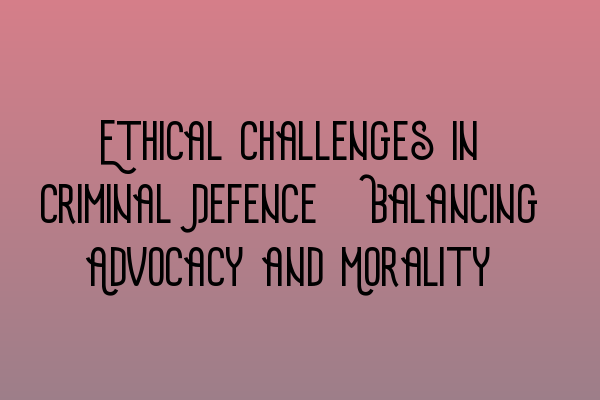Ethical Challenges in Criminal Defence: Balancing Advocacy and Morality
As criminal defence solicitors, we are tasked with the crucial responsibility of advocating for our clients while upholding our ethical obligations. This balancing act between advocacy and morality presents unique challenges that require careful consideration and professional judgment.
One of the primary ethical challenges we face is the moral dilemma of defending individuals who may be guilty of criminal offenses. Our duty as defence lawyers is to provide a fair and robust defence, ensuring that every accused person receives a fair trial and is not wrongfully convicted.
However, this commitment to the principle of ‘innocent until proven guilty’ often confronts us with the moral implications of representing someone we believe to be guilty. It requires us to separate our personal beliefs from our professional obligations, upholding the sanctity of the legal process.
Another ethical challenge arises when advocating for clients whose actions we find repugnant or morally objectionable. For instance, defending individuals accused of heinous crimes such as murder or sexual assault can test our personal convictions. We must strive to provide a zealous defence while respecting the rights of victims and maintaining the public’s trust in the criminal justice system.
It is important for criminal defence solicitors to maintain a strong moral compass and adhere to a set of ethical principles. Our role is not only to secure the best outcome for our clients but also to uphold the integrity of the legal profession. By maintaining professionalism, we can navigate these ethical challenges and fulfill our duty to the justice system.
One way to address these challenges is through constant self-reflection and self-assessment of our personal biases. By acknowledging our own moral values, we can better understand our limitations and biases, making us more effective and impartial advocates.
Furthermore, ongoing professional development and training are essential to stay abreast of changes in the law and ethical considerations. Courses such as SQE 2 Preparation Courses and SQE 1 Preparation Courses provide valuable knowledge and skills to navigate the ethical complexities of criminal defence.
Ultimately, striking the right balance between advocacy and morality is an ongoing process. It requires a deep understanding of our professional obligations, a commitment to the rule of law, and a dedication to upholding justice. By effectively managing these ethical challenges, we can fulfill our duty to our clients, the legal system, and society as a whole.
For more information on related topics, you may find the following articles helpful:
